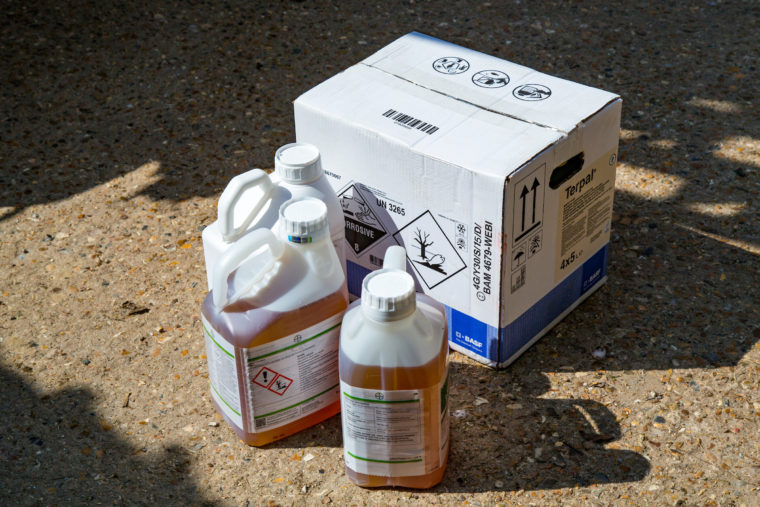Woldmarsh Agrochemical
As one of the large purchasing groups, with members concentrated in Lincolnshire, Yorkshire, and the surrounding counties, it will come as no surprise that our members look to us to source much of their agrochemical requirements for them. The eastern side of England, particularly the Midland and more Northerly area, is dominated by the growing of combinable crops with a significant proportion of the UK potato crop also grown here. The further south you go, the greater the number of vegetable crops that you see as well as root crops such as sugar beet. A group like ours needs to be versatile and adaptable to be sure that we can cater for this diverse cropping and whatever plan an individual farmer wishes to adopt. It is for this reason that we procure around 5% of the annual UK agrochemical purchases and are a trusted partner with our over 1,000 farmer members.
Agronomy in the UK is dominated by six main distribution companies and a collection of smaller ones, often regionally located. In general, there are two main ways that farmers obtain agronomic advice. Firstly, tied agronomy, where advice and chemical are largely sourced from the same distribution company. Secondly, independent agronomy, with advice being supplied by an adviser (or occasionally self-identified following BASIS training) who recommends agronomic solutions, leaving the farmer to source the chemical from his supplier of choice. Within Woldmarsh, there is a near 50:50 split between these two, with the farmer choosing which type of agronomy he would prefer.
‘Tied’ or Independent Agronomy
For all members, whether tied to a distributor or independent, the role of the group is similar. Either you or your agronomist sends us the order to place on your behalf or orders are sent directly to your distributor of choice. If we place the order, our role is to identify the appropriate source, based on your requirements. Delivery is via the normal distribution channels. On other occasions, because it suits the farmer, orders are placed directly with the distributor and Woldmarsh handles the invoicing. In either event, we, as a non-profit making enterprise, owned by the members, act as an honest broker. Keeping an eye on the marketplace and ensuring that the prices charged are fair.
For independent agronomy, we have the option to place chemical requirements at multiple outlets to ensure the optimum combination of price, delivery, and brand or generic to meet your requirements. Usually, we limit the sources delivering any one order. This is because we do not want to hold up a spray programme for a minor but vital component of a tank mix that has not arrived. It is equally important that we ensure delivery of what you ordered. We do not switch products without confirming that this is acceptable to you. We understand there could be an E.M.U. or specific crop requirement. Independent agronomists operate on the basis of wide-ranging independent advice sources. Whilst they may recommend branded products, they are just as likely to recommend active ingredients that act against the pests and diseases they see in your crop. Most of them adopt a spray plan that tackles what they see, linking this to the farmer’s attitude to risk and financial considerations, to prepare a bespoke approach, rather than a universal plan for all clients covering potential issues.
By recommending active ingredients, the options to create your own tank mixes are greater and for the most part, will work out cheaper than “off the shelf” mixes. On the back of this, because we have a freer hand in ordering the chemical from the sources we choose, circumstances may allow us to negotiate end-of-season rebates. These are all returned to the members who used these products. We hold a database of over 2,000 live negotiated product prices with final terms agreed twice a year in July and January. Our industry expertise means we have excellent relationships with manufacturers of crop protection products. This gives us the latest information on current products, and an insight into the technologies of the future and this is shared with you. It also allows us to confirm that we are ensuring our members obtain chemicals from reputable sources.
Tied agronomy, on the other hand, tends to favor their own bespoke versions of the active ingredients in unique mixes with their own trial results demonstrating the effectiveness of these. Tied agronomy also prefers to include the cost of the advice within the cost of the chemical you buy. Whilst this is simple, you cannot clearly see how much you are being charged for advice and how much for chemicals. In our view this should be transparent for you to be able to control your farm costs effectively.
It is, however entirely up to you which route you take. In both cases, planning for the forthcoming season, provides distributors, manufacturers and you the end user, much greater certainty that your needs for the season ahead are catered for and fulfilled. Whatever your preferred option, in both cases, invoice handling is our role and the one bill a month routine is part of the service we provide to you.
Who is on the team?
Our staff are extremely experienced when it comes to understanding the chemicals available and their limitations. The current Woldmarsh agrochemical team has over 50 years combined experience in this market, and this, with our staff being on the professional BASIS register, enables us to offer an informed, up-to-date view on the whole industry. FWe are in constant communication with our members and their agronomists, keeping them up to date with industry developments and pricing information. So, if you need to know market trends, when’s a good time to buy or any other aspect of what’s happening, our agrochemical team is where to go for an unbiased view.


